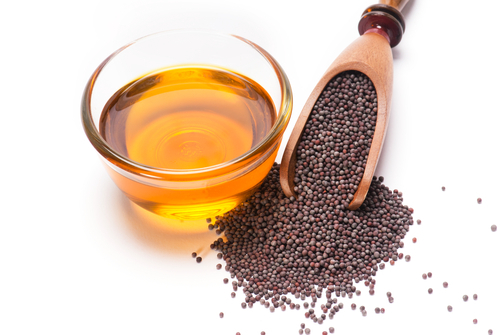Is Mustard Oil Bad For You?
Short answer
Expressed mustard oil is not currently permitted by the FDA - it’s got high levels of erucic acid, which can damage your heart. The evidence is somewhat cloudy, however, and not everyone agrees with their decision.
Recommended Alternative
'N' stands for neutral. Things placed into this category are (a) neither good nor bad for you, or (b) lack the necessary evidence to reach any conclusions.
View Full Grading System
Category 'A'
Very healthy and numerous health benefits. Side effects are rare. Things rated an 'A+' are typically necessary for survival (for example, water).
Very healthy and numerous health benefits. A few harmful qualities may be associated, but only under certain circumstances such as an allergic reaction.
Very healthy and numerous health benefits. Harmful qualities may be associated, but aren't usually serious.
It is important to note that even the best things in life can become bad in immoderate amounts. So, although something may be rated an 'A+', overconsumption/overdoing can bring unwanted effects.
Category 'B'
Very beneficial to your health. Things rated a 'B+' may have a few harmful qualities to pay attention to.
Overall beneficial to your health. Things rated a 'B' may have some harmful qualities to pay attention to.
More beneficial to your health than not. However, harmful qualities are most likely associated and shouldn't be overlooked.
The main difference between category 'A' and category 'B' is the harmful qualities typically present in 'B' items. Serious side effects are usually uncommon, but are still possible and should be taken note of.
Category 'C'
Both beneficial and harmful qualities associated. Things rated a 'C+' are typically a bit more on the beneficial side. Still, moderation is important.
A fairly even ratio of beneficial and harmful qualities. Moderation is important. Very general topics that can lean towards both sides of the spectrum will be placed here as well. Rice, for example, can be good or bad depending on the type.
More harmful than beneficial. Side effects are common, especially when consumed/done excessively. Moderation is very important.
Category 'C' usually denotes to both good and bad qualities. When it comes to this category, it is important to keep this word in mind: moderation.
Category 'D'
Harmful to your health. Although benefits may be associated, the bad most likely outweighs the good. Moderation is very important.
Harmful to your health. A few benefits may be associated, but the bad outweighs the good. Moderation is extremely important.
Harmful to your health. Very few, if any, benefits are present. Things in this category should be avoided as much as possible.
Category 'D' is typically for things that are more harmful than beneficial. While consuming/doing something unhealthy once in a blue moon shouldn't hurt, we definitely recommend eliminating 'D' items as a regular part of your routine/diet.
Category 'F'
Category 'F' is for things that fail to bring anything beneficial to the table, and are very harmful to your health. We recommend completely avoiding anything in this category. Long-term side effects of 'F' items are usually very serious.
Category 'N'
'N' stands for neutral. Things placed into this category are generally (a) neither good nor bad for you, or (b) lack the necessary evidence to reach any conclusions.
Long answer
There are two kinds of mustard oil. The essential sort comes from ground mustard seeds suspended in liquid. The food industry uses marginal amounts to flavor pungent products like horseradish or wasabi - any more, and it can be a serious irritant.
Expressed mustard oil is squeezed out of mustard seeds in a press. It's commonly used as a cooking oil in different Asian cuisines. The FDA slapped it with an import warning within the past few years - right now, they only permit expressed oil for external use.
That's because expressed oil has unusually high levels of erucic acid. Testing by the FDA has pegged levels of the acid around 20 - 40%. Animal studies have shown that erucic acid to have serious risks; give too much to a rat, and it might develop cardiac lesions, amongst other problems. That's the main reason why expressed mustard oil is not approved for human consumption by the FDA, whereas essential mustard oil is approved for human consumption and generally regarded as safe.
This ruling by the FDA has been the subject of some controversy. Expressed mustard oil is rich in omega-3 fatty acids, which are actually good for the heart in the right ratio with their acidic cousins omega-6. The American Journal of Clinical Nutrition actually found that expressed mustard oil was good for heart health, rather than bad, in a study published back in 2004.
That study shouldn't be taken as gospel - the FDA is in the business of weighing available evidence rather than conclusively proving whether or not different foods are "good" or "bad." Still, there's a vocal contingent of mustard oil stans in the United States who buy up bottles marked for external use and employ them to cook Thai food instead.
The New York Times did a fairly balanced write-up of expressed mustard oil in 2011; they quoted a handful of nutritionists and scientists who determined that a dash of the expressed stuff likely won't kill you. If you have a history of heart problems, however, you may want to steer clear.
Possible short-term side effects
- allergic reaction
-
diarrhea
Possible long-term side effects
- anemia
-
bodily inflammation
-
cardiac lesions
-
increased lung cancer risk
Ingredients to be aware of
Benefits
- rich in omega-3 fatty acids
-
promotes hair health
-
promotes skin health
-
may help treat gum disease
-
may promote heart health
Our Wellness Pick
(what is this?)
Bragg Organic EVOO
- USDA Organic Certified
- Non-GMO
- Cold-pressed quality
- Kosher
- Made with Greek olives
Learn More!
Please turn your Ad Blocker off to see this content. Thank you!

 Approved by
Approved by 















